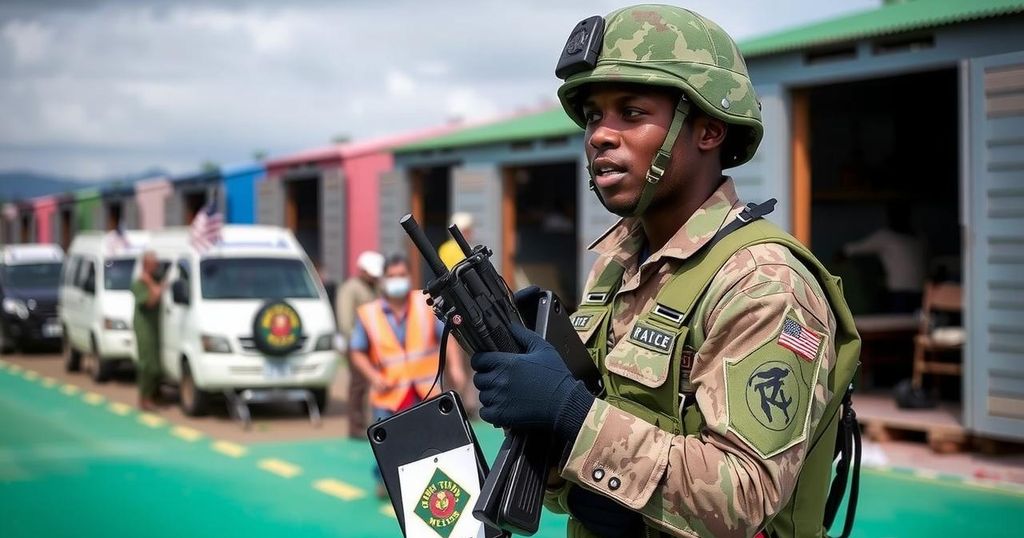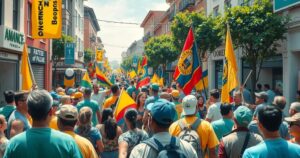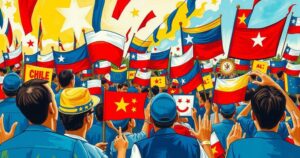Guatemalan and Salvadoran Troops Mobilize in Haiti: A Call for Solidarity and Self-Determination

Guatemalan and Salvadoran troops have arrived in Haiti as part of an expanded international mission backed by the U.S. and UN, amidst claims of rising gang violence affecting state authority. This recent troop deployment emphasizes ongoing historical issues of foreign intervention and imperialism in Haiti’s governance. Despite challenges including inflation and environmental crises, the Haitian population is calling for an end to foreign military presence and the establishment of true democratic processes.
Guatemalan and Salvadoran troops have recently arrived in Haiti, raising concerns about an extended international occupation facilitated by the United States and the United Nations. This development follows a November 2024 meeting of the UN Security Council, where Assistant Secretary-General Miroslav Jenča emphasized the need for additional security forces to address so-called “gang violence” in Haiti. However, this perspective neglects the historical context of imperialism that has systematically destabilized Haiti since its independence in 1804. The presence of international troops, including Kenyan officers already on the ground, is being presented as a response to security concerns characterized by the continuing degradation of state authority.
During a formal reception at Port-au-Prince’s International Airport, various Haitian officials, including the U.S. Ambassador to Haiti, welcomed the initial contingent of 75 Guatemalan and eight Salvadoran officers as a crucial step towards restoring order. Yet, the narrative surrounding this event frames it as a cooperative alliance between these foreign forces and the purportedly democratic Haitian government, even as public opposition against this occupation grows. Many Haitian citizens perceive this partnership as a violation of their autonomy, echoing the larger historical struggle against colonial exploitation.
Compounding the situation, Haiti is currently grappling with rampant inflation and a humanitarian crisis exacerbated by both environmental disasters and economic exploitation. Reports indicate that staple goods are priced far above the average income of Haitian workers, who often struggle to provide basic necessities for their families. Moreover, recent severe weather has caused significant flooding and mudslides, further challenging the resilience of affected communities.
Despite these adversities, the Haitian people remain resilient, increasingly vocal in their calls for genuine self-determination, the removal of the transitional government, and an end to foreign intervention. The history of the Haitian Revolution, which was rooted in the quest for liberty and self-governance, compels citizens to resist contemporary forms of neocolonial occupation. Therefore, as internationalist observers, it is imperative to advocate for a cessation of foreign military presence and to uphold the sovereignty of the Haitian people, respecting their historical fight for autonomy and rights.
The arrival of troops from Guatemala and El Salvador in Haiti is part of a broader effort by international forces, specifically under the auspices of the United Nations and the United States, to stabilize the country amidst ongoing violence and political instability. The UN’s engagement in Haiti has historically been marred by allegations of imperialism and colonialism, with critics arguing that external interventions have often exacerbated local issues rather than resolving them. The narrative surrounding “gang violence” being a primary concern detracts from the systemic problems rooted in the country’s colonial past and ongoing external exploitation, including environmental challenges and economic inequality. As Haiti faces a humanitarian crisis with inflated prices and deteriorating living conditions, there is a growing demand among the populace for genuine democracy and the cessation of foreign dominance.
In summary, the arrival of international troops in Haiti signals an ongoing trend of foreign intervention framed as a necessity for stability. However, this scenario reflects deeper historical injustices and a continuous struggle for Haitian sovereignty. The Haitian people, resolutely demanding an end to foreign occupation, advocate for their autonomy and the establishment of true democratic governance, urging the international community to respect their rights and historical legacy. Solidarity with Haiti is paramount in the face of renewed interventions that threaten its dignity and self-determination.
Original Source: www.liberationnews.org






